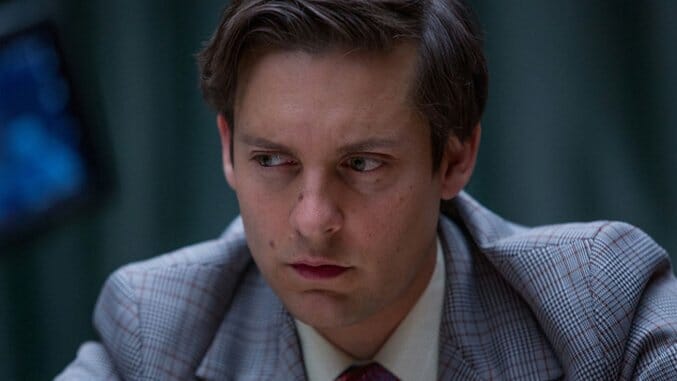Pawn Sacrifice

The name Bobby Fischer might trigger a Google search for some of the internet age who haven’t at least dabbled in chess. For those who recollect the epic clashes of the ’70s—Ali vs. Frazier, the U.S. and U.S.S.R. ensconced in the heat of the Cold War—Fischer was likewise a prominent player on the international stage of conflict. His arena, while smaller and with less prospect of bloodshed, was no less tumultuous. In the bigger scheme, it plastered the chess prodigy across as many magazine covers as the two well-matched pugilists, and more so, had a profound impact on the cultural and ideological sparring between Uncle Sam and the Kremlin.
For those hoping for more than a Wikipedia regurgitation of the facts, even-keeled director Ed Zwick (Glory, The Last Samurai) goes beyond a dull history refresher, putting the volatile genius’ contribution to the game and global politics, as well as his struggle with mental illness, in context. It’s by the latter facet that Pawn Sacrifice gains our hearts. Fischer grew up a poor Jewish kid from Brooklyn, but he was on the national stage by the time he was a preteen. Even at that young age, when his talent was glaringly obvious, he was an arrogant prick already displaying the clinical signs of delusions. As the movie has it in one early scene, he demands his mother banish her boyfriend because the soft coos from their infrequent sex disrupts his practice in their small apartment.
As a young man in the late ’60s Fischer, now played by the boyish Tobey Maguire—sporting prosthetic facial blemishes to make him look less wholesome and handsome—would become the American chess champ, face the Russians and get drubbed. When his claim the Russians teamed up to stack the deck against him went largely unheard, he told the press he quit the game. That’s where Zwick’s film takes off, transitioning from a per-usual plodding biopic into something more reflective and refreshing.
-

-

-

-

-

-

-

-

-

-

-

-

-

-

-

-

-

-

-

-

-

-

-

-

-

-

-

-

-

-

-

-

-

-

-

-

-

-

-

-








































